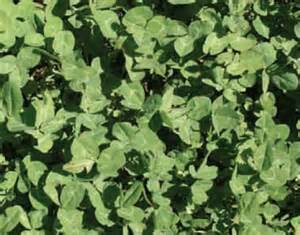Mainly growing in spring, White Clover blights lawns, can harbour pests such as Red-legged Earth Mite and Light Brown Apple Moth and can cause serious health problems for sheep including reduced fertility, difficult lambing, prolapse in ewes lactation and urinary obstructions.
Found in crop areas, pastures, gardens, roadsides, swamps, granite outcrops and disturbed areas, White Clover can also cause Clover disease, bloat, photo sensitisation and some strains for the weed are capable of causing HCN poisoning.
White Clover can easily be identified by its creeping hairless stems, leaflets hairless and usually have a white V shaped bands across them. White Clover produces many white to pinkish flowers in heads on long peduncles and a seed pod containing either 3 or 4 seeds.
Long distance dispersal of White Clover is mainly by intentional planting, dumping of garden refuse, in nursery pots and in lawn seed and revegetation seed mixes where as more local spread is caused mainly by seed and creeping stems that root at the nodes. Animals can also spread White Clover by both external and internal transport.
Small outbreaks can be removed by hand, however White Clover can spread quickly and therefore spot spraying is the best alternative for larger infestations.
Relevantly tolerant to grazing and Glyphosate, it is advised that a 25 mL wetting agent plus 4 g Lontrel®750 or 1 g Logran® or 0.1 g metsulfuron(600g/L) or 0.1 g chlorsulfuron(750g/kg) in 10 L water is used for spot spraying when White Clover are actively growing in spring. Using an effective spot sprayer, thoroughly coat the entire plant allowing the herbicide to run off the plant. Repeat these treatments annually for several years and plant tall growing perennial species to reduce the risk of re-invasion.
For help and advice on choosing the most effective spray equipment to suppress White Clover, click here or call 1800 011 000 to speak to a friendly member of the Rapid Spray team.



